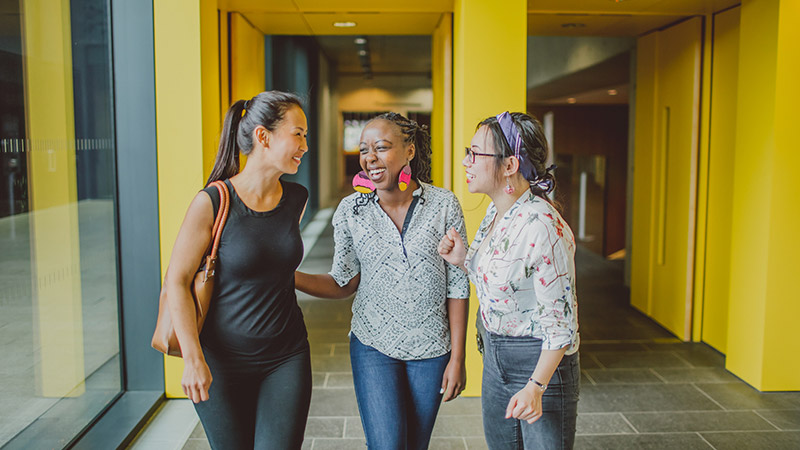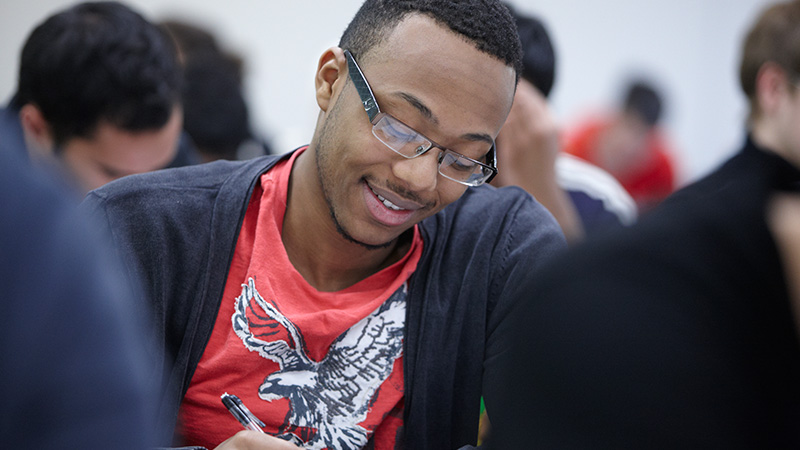Education (Artist Teacher Practice)
MA
Key facts
Start dates
September 2024
Course length
Part time: 3 years
Overview
Transform your practice - and grow as an artist, professional and art educator.
On this course you’ll develop your artistic practice. You’ll push boundaries and take creative risks. You’ll create, exhibit, interpret and reflect on art. And you’ll witness your growth as an artist.
You’ll learn as part of a vibrant and supportive community of art educators and professional artists who are passionate about art. You’ll have the freedom to take your learning and your practice in any direction you choose. And you can focus on any medium - like:
- painting
- ceramics
- textiles
- video
- sound
- performance
As you develop artistically, you’ll also broaden your art teaching skill set. You’ll spark new ideas and create new teaching approaches. You’ll emerge equipped to break into art teaching or ready to take your teaching to the next level. And you’ll have a professional practice that stands up to artistic scrutiny.

How to apply
Entry requirements
Specific entry requirements
Applicants need to be working in art education in some capacity. It is preferable that candidates have a first degree in education or an art-related practice, although this can be negotiated according to individual circumstance. Applicants do not need Qualified Teacher Status.
Please also see the University's general entry requirements.
English language requirements
IELTS level 6.5 or above with a minimum of 6.0 in reading and writing and 5.5 in speaking and listening.
Please also see the University's standard English language requirements.
English requirements for visas
If you need a student visa to enter the UK you will need to meet the UK Visas and Immigration minimum language requirements as well as the University's requirements. Find out more about English language requirements.
Pathways courses for international and EU students
We offer a range of courses to help you meet the entry requirements for your postgraduate course and also familiarise you with university life in the UK.
Take a Pre-Master's course to develop your subject knowledge, study skills and academic language level in preparation for your master's course.
If you need to improve your English language, we offer pre-sessional English language courses to help you meet the English language requirements of your chosen master’s course.
Terms and Conditions of Enrolment
When you accept our offer, you agree to the Terms and Conditions of Enrolment. You should therefore read those conditions before accepting the offer.
Application process
All UK and International applications for this course; please make your application direct to the university.
Tuition fees
Questions about fees?
Contact Student Finance on:
Tuition fees
Fees quoted are for the first year only. If you are studying a course that lasts longer than one year, your fees will increase each year.
The following factors will be taken into account by the University when it is setting the annual fees: inflationary measures such as the retail price indices, projected increases in University costs, changes in the level of funding received from Government sources, admissions statistics and access considerations including the availability of student support.
How and when to pay
Tuition fee instalments for the semester are due by the Monday of week 1 of each semester. Students are not liable for full fees for that semester if they leave before week 4. If the leaving date is after week 4, full fees for the semester are payable.
- For information on payment methods please see our Make a Payment page.
- For information about refunds please visit our Refund policy page
Additional costs
Please be aware that some courses will involve some additional costs that are not covered by your fees. Specific additional costs for this course are detailed below.
Compulsory costs
| Additional costs | Amount (£) |
|---|---|
| You will need to purchase materials for the compulsory module Developing Personal Artistic Practice. | £100 |
Optional costs
| Additional costs | Amount (£) |
|---|---|
It’s your responsibility to cover print / binding costs where coursework submission is required. Please note that a lot of the coursework is now submitted online. |
From £30 |
| You may choose to purchase books to support your studies. Many books on our reading lists are available via the Library, or can be purchased secondhand. | £20-60 per book |
Accommodation fees in Brookes Letting (most do not include bills) |
£94-265 per week |
Accommodation fees in university halls (bills included, excluding laundry costs) |
£122-180 per week |
Graduation costs include tickets, gowning and photography. Gowns are not compulsory but typically students do hire robes, starting at £41. |
Typically £0-200 |
Students are responsible for their own travel to and from university for classes. BrookesBus travel is subsidised for full-time undergraduate students that are on a course with a fee of £9,250 or more, or living in an Oxford Brookes hall of residence. There is an administration fee for the production of a BrookesKey. |
From £10 |
Funding your studies
Financial support and scholarships
Featured funding opportunities available for this course.
All financial support and scholarships
Learning and assessment
On the course, you’ll develop a practice that authentically represents your own ideas and inspirations. Our teaching structure is open-ended. You’ll be guided to make, exhibit, interpret and reflect - but you can take your learning in any direction.
You’ll also examine contemporary themes in art. And you’ll consider works through lenses like anti-racism, decolonisation, gender and queer culture.
You’ll work with a community of practitioners who are passionate about art - and from all different contexts - including:
- art and design teachers
- community art instructors
- artists in residence
- gallery or museum educators
You’ll share ideas, challenge perspectives and learn from each other. And you’ll develop a lasting network of art education professionals.
You’ll be supported to exhibit artworks locally, regionally and nationally. For example, the Settlement Virtual Exhibition was developed with students and alumni, in partnership with the Pitt Rivers Museum and Henge21 - a local community arts project.

Study modules
You’ll need to achieve 180 credits over the course of your studies. This includes 140 credits of compulsory modules, and 40 credits from optional modules.
Learning and teaching
If you choose the on-campus mode of study, you’ll learn at Harcourt Hill, our Education campus. Your learning will combine whole-day intensive sessions, plus online and independent learning. On-campus sessions are on intermittent Saturdays, supported by regular online twilight seminars. You’ll be able to balance your learning with other commitments.
If you choose to do the course via distance learning, you’ll learn via interactive and high quality online resources. And you’ll participate in live online seminars.
Your learning will be visual, written and verbal - with equal emphasis on written and visual work. Each module builds upon the last, helping you meaningfully deepen your practice. And you’ll be closely supported by your tutors as you transition to build your research skills and deepen your academic abilities.
Field trips
We are partnered with the Pitt Rivers Museum in Oxford, and work with other Oxford University museums as well. You’ll have the opportunity to collaborate with teams and practitioners across the Pitt Rivers, like:
- curators
- researchers
- artists, designers and craftspeople
- the Learning and Community Team
The Pitt Rivers has a diverse and dynamic collection - including temporary exhibitions and community projects. You’ll have opportunities to work directly with the many professionals involved in the museum’s work, and participate in innovative projects.
Assessment
Assessment methods used on this course
You’ll be assessed in different ways - you’ll have the opportunity to develop and showcase your strengths. All your assessments will incorporate your professional practice.
Your assessments will include methods like:
- portfolios
- exhibitions
- presentations
- reflective journals
- essays
- criticals
Research
The School of Education, Humanities and Languages is a thriving centre for educational research and teacher professional development. Students on master's level programmes therefore join a large research community comprising researchers at all levels of higher education study.
We hold two major research conferences each year - the School of Education Research Conference and the EdD Colloquium. All students are invited to attend our annual Research Seminar Series (which attracts both internal and external speakers). We also organise a number of conferences, lectures, seminars and debates, some of which have an international reach.
The School’s six research groups exist to encourage engagement in research, publication, conference presentations, seminars and workshops:
- Inclusion and Wellbeing
- Policy, Partnership and Leadership
- STEAM pedagogy and learning
- Humanistic Perspectives on Education
- Early Years
- Applied Linguistics
View all staff profiles for the School of Education, Humanities and Languages

After you graduate
Career prospects
You’ll graduate ready to take the next step in your career. You’ll have developed a strong skill set in art education. And you’ll graduate ready to:
- take your art teaching to the next level
- land your first art teaching role
- progress to more senior roles in your school
- launch your career as a professional artist
- proceed into academic research
You’ll be able to confidently advocate for art in all different settings. You’ll be able to influence school leadership and manage Ofsteds - decisively making the case for art education.
You’ll also emerge with an established artistic practice, that you can continue developing for years to come. And you’ll be well prepared to step into the professional art scene as well.
Previous graduates have progressed into roles like:
- Head of Department in schools
- Primary Art Coordinator
- university teaching and research
- artist in residence opportunities
Related courses
Programme changes:
On rare occasions we may need to make changes to our course programmes after they have been
published on the website. For more information, please visit our
changes to programmes page.
